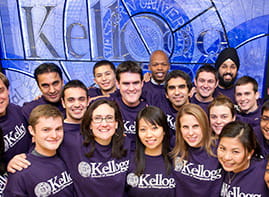4/24/2015 -
From cranberry-focused nutrition startups to problem solving for crowd-sourced inventions, Kellogg teams continue to take top honors in case competitions around the world. Here are a few of their recent wins:
Wake Forest University School of Business Marketing Analytics Summit
A five-person team from Kellogg took first place and $20,000 at the Wake Forest University School of Business Marketing Analytics Summit case competition held April 8.
Composed of students from the One-Year Program, the Kellogg team had to create a strategy that would increase in-store mobile use through habituation, value to the customer and utility to the retailer. Team members Adam Hirschkatz, Marissa McGann, Nick McGann, Yajur Kapoor and Alex Bourdeau (all ’15) developed a four-part strategy that called for in-store mobile marketing, a mobile app for promotions, a personalized loyalty program for customers and an analytics engine for insight into customer behavior.
“We used a number of sources to develop industry and consumer insights in order to develop a mobile strategy aimed at improving metrics for our client,” said Bourdeau on behalf of the team.
5th Annual Deloitte National MBA Case Competition
Three Kellogg students took first place in January’s Deloitte National MBA Case Competition. Sponsored by Deloitte and Deloitte Foundation, the MBA Competition tasked 15 finalist teams with solving numerous strategic challenges on behalf of Quirky, Inc., a New York City-based invention and consumer product company.
With a 10-hour time limit to produce a professional-grade presentation, Matt Heintz, Andry Lesmana and Bora Sekerel, all ’16, came together to create winning recommendations on segment selection, including a $20,000 scholarship prize and top honors. Being the first team in contest history to have three team members instead of four sweetened the victory.
“I always heard that business school changes you, but this was the moment I knew what that meant,” says Heintz. “Kellogg's focus on collaboration ensured we were ready to work efficiently and smoothly to tackle this challenge.”
2015 Media & Entertainment Case Competition
For the first time since launching their annual entertainment, sports and technology conference, the UCLA’s Anderson School of Management held a case study competition.
Matt Weiss ’16, Libby Koerbel ’16, Chris Phillips ’16 and Anja Zhao ’15 won the $4,000 First Place prize by creating a strategy to aid event sponsor Paramount Pictures increase shrinking margins due to mobile media consumption and streaming services.
“We wanted to connect the cinema and at-home-viewing experiences,” says Weiss. “The key insight behind our solution was creating a journey centered on the Paramount brand that motivated customers to return to the theater.”
The team and Paramount executives are discussing turning their proposal into an implementable business plan.
Wharton MBA Buyout Case Competition
For the second straight year, a Kellogg team won the Wharton MBA Buyout Case Competition.
Michael Jiwani ’15, Joe Long ’15, Justin Marku ’15 and Evan Cooney ’16 came in first place in the February contest that asked MBA students to make recommendations for a proposed private equity buyout for a major retailer, and earned $3,000.
“We knew a win would be difficult to repeat; however, our team never doubted our approach or ability to get the job done,” says Jiwani. “We were excited to have represented our fellow students at Kellogg and our private equity alumni base in such a positive light.”
Suzhou New District Technological Innovation and Entrepreneurship Competition
Health and nutrition start-up Kosmode Biotechnology is the company that earned Rochelle Hua and Cindy Ye, as well as McCormick graduate student Kevin Shi, all ’15, the top prize of $5 million yuan (RMB), or about $800,000.
Hua, a former food scientist, credits long-term research collaboration with a professor as the inspiration for Kosmode. The Jiangsu Province-based company expects its first product to be a cranberry supplement that will treat urinary tract infections.
“We patented the extraction method for producing this product at a low cost and high quality,” says Hua. “The next step is to materialize what was written in the plan — scale up the product and sell.”
Related reading:






